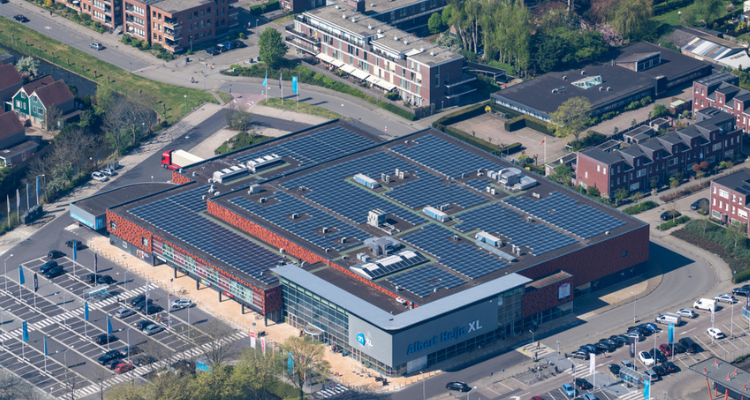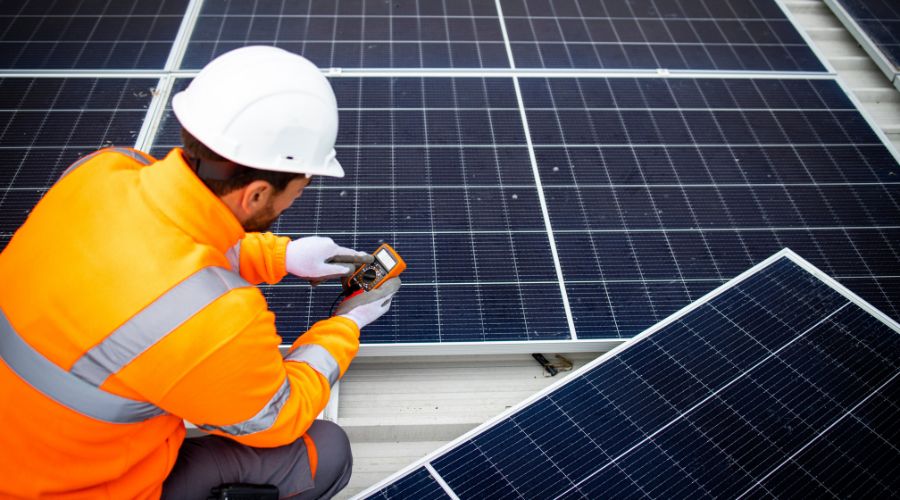As we advance into the 21st century, the importance of transitioning from finite, pollutant fossil fuels to renewable energy sources becomes increasingly evident. Among the various forms of renewable energy, solar energy has risen in popularity and accessibility, shining a beacon of hope for a cleaner, more sustainable future. This article aims to delve into the many advantages of solar energy and underscore why so many homeowners, businesses, and nations worldwide are switching to this inexhaustible, locally-produced energy resource.
Solar energy, derived from the sun's radiation, is an incredibly powerful and, importantly, clean energy source. It has proven extremely beneficial for the environment, economically, and socially. Not only can it create a greener planet by reducing carbon emissions, but it can also present an opportunity for job creation and energy independence. The benefits of going solar are plentiful, and as we journey together through this article, you will uncover the myriad solar energy pros that have the potential to revolutionize our world. Whether you're considering a switch to solar or just curious about solar energy facts, this comprehensive guide will shed light on why solar power is one of the most effective and important energy sources of our time.
Understanding Solar Energy
Solar energy, put, is the energy that is generated from the sun's light and heat. The concept of harnessing this abundant and potent energy is not new. For centuries, civilizations have sought ways to capture and use solar power, but it wasn't until the 19th century that the first practical solar energy system was developed. Thanks to significant technological advancements, we can convert sunlight into electricity using photovoltaic cells, a key component of solar panels.
To understand the advantages of solar energy, one must first grasp how solar power works. Solar panels, usually installed on rooftops, collect sunlight and convert it into direct current (DC) electricity. This DC electricity is then transformed into alternating current (AC) electricity through an inverter, which can power homes, businesses, or any other building connected to the system. Furthermore, many solar energy systems are connected to the local power grid, allowing excess electricity to be fed back into the grid or drawn from the grid when additional power is needed.
Different types of solar energy systems cater to different needs. There are grid-tied systems connected to the local electricity grid, and can use grid power when solar power is insufficient. On the other hand, off-grid systems function independently of the grid and often include battery storage to store excess power during nighttime or overcast conditions. Hybrid systems combine the best of both worlds with a grid and battery storage connection to ensure a reliable power supply.
Understanding these basics is crucial when examining the benefits of going solar. From the simple operation of converting sunlight into usable energy to the flexibility of different types of systems, solar power offers a highly efficient, sustainable, and versatile energy solution. As we dig deeper into solar energy advantages, these factors play a significant role in many of the benefits we'll explore.
The Economic Advantages of Solar Energy

One key benefit that draws individuals and businesses towards solar energy is its economic advantages. These are evident in various forms, from immediate reductions in electricity bills to long-term price stability and government incentives.
- Lower Electricity Bills: Upon installing solar panels, homeowners and businesses can start generating their electricity. This significantly reduces their electricity bills since they are less dependent on the grid. According to numerous solar energy statistics, homeowners who switch to solar energy save an average of $1,000 per year on electricity bills.
- Stability of Energy Prices: Solar energy allows users to escape the fluctuations of traditional energy costs. Once solar panels are installed, the cost of generating solar energy remains constant and effectively free. Thus, solar energy offers significant savings and shields you from unpredictable increases in utility rates.
- Government Incentives and Subsidies for Solar Energy: To promote clean and sustainable energy, many governments offer incentives, grants, and tax credits for installing solar panels. For instance, in the U.S., the federal solar tax credit, or the Investment Tax Credit (ITC), allows you to deduct a percentage of the cost of installing a solar energy system from your federal taxes.
- Increased Property Value due to Solar Installations: Properties equipped with solar energy systems are increasingly in demand. Studies show that homes with solar panels sell faster and at higher prices than non-solar homes. So, apart from saving on electricity bills, solar panels can make a valuable addition to your property.
The cost-effectiveness of solar energy is a compelling reason to switch to this renewable source. Solar energy proves itself as a financially prudent choice by providing direct savings on energy bills, ensuring energy price stability, offering enticing incentives, and increasing property value.
Additional Financial Advantages of Solar Energy

Beyond the direct economic benefits of lower electricity bills and government incentives, there are additional financial advantages of solar energy that are worth considering. These include potential revenue generation, job creation, and the overall economic impact of the solar industry.
Potential for Revenue Generation: Depending on where you live and the local utility policies, you may be able to sell excess solar energy back to the grid. This concept, known as net metering, allows you to generate revenue from the surplus electricity your solar panels produce, further offsetting the cost of the system and potentially even turning a profit.
Job Creation: The solar industry has been a significant job creator over the last decade. According to the Solar Foundation, the industry added jobs nearly 20 times faster than the overall economy in recent years. Investing in solar energy supports local manufacturing, installation, and maintenance jobs, stimulating economic growth in your community and beyond.
Indirect Savings: Solar energy can offer indirect savings by reducing the strain on the power grid during peak demand times, such as hot summer days. By lessening the demand on the grid, solar energy helps reduce overall energy costs, leading to lower electricity prices for everyone in the community. Plus, solar energy systems are low-maintenance, further contributing to their cost-effectiveness over time.
Business Reputation and CSR Goals: For businesses, switching to solar energy can enhance their reputation as responsible, eco-friendly companies. This can increase customer and client attraction, potentially boosting sales and profits. Moreover, solar energy can contribute significantly to a company's Corporate Social Responsibility (CSR) goals, strengthening its brand and potentially attracting investors who prioritize environmentally and socially responsible practices.
Solar energy presents itself as an excellent financial decision through potential revenue generation, job creation, indirect savings, and the enhancement of business reputation. With these additional financial benefits, it becomes clear that investing in solar power is not only a sustainable choice for our planet but also a smart and strategic economic decision for both individuals and businesses. Solar energy offers the dual advantage of being eco-friendly and financially sound, providing a compelling argument for why more and more people should consider going solar.
Advantages of Solar Energy for Energy Independence
Solar energy isn't just an economically smart choice; it also paves the way for energy independence, a concept that's gaining momentum across the globe. By harvesting the energy that our sun abundantly provides, countries, communities, and individual homeowners can reduce their reliance on fossil fuels and other non-renewable energy sources, fostering a more secure and resilient energy future.
- Reduction of Dependence on Fossil Fuels: One of the key advantages of solar energy is its role in reducing our dependence on fossil fuels like coal and natural gas. Fossil fuels are finite and subject to volatile price changes and geopolitical tensions. By adopting solar energy, individuals and nations can produce their own clean, renewable power, reducing reliance on these unstable energy sources.
- Solar Energy as a Domestic Resource: Unlike fossil fuels, which are often imported, solar energy is a locally produced resource. No matter where you are, the sun shines, providing an inexhaustible supply of energy that doesn't require transport or cause geopolitical conflict. This local production of solar energy leads to greater energy security and independence.
- Increase in Energy Security and Resilience: Solar energy can help build a resilient power grid. Solar panels (especially those with battery backup) can continue providing electricity in the event of a power outage or grid failure. This is particularly beneficial during natural disasters or other emergencies when reliable power can be life-saving.
- Opportunities for Off-Grid Living: Solar energy offers an affordable and practical solution for remote or rural areas where access to the electricity grid is challenging or expensive. Solar panels and accompanying battery storage systems can provide reliable, round-the-clock power in these off-grid locations, bringing electricity to people and places that might otherwise go without.
The capacity for energy independence is a powerful advantage of solar energy. Solar power is an empowering and liberating energy source by allowing us to reduce our reliance on fossil fuels, harness a locally produced resource, increase our energy security, and provide opportunities for off-grid living. This independence contributes significantly to the economic and social benefits that make solar energy an increasingly popular choice.
Health and Social Benefits of Solar Energy

The switch to solar energy has far-reaching impacts beyond economic and energy independence. It has significant health and social benefits that contribute to an improved quality of life and the development of stronger, more sustainable communities.
Reduction in Air and Water Pollution: Solar energy production involves no pollution, a stark contrast to fossil fuel energy generation that emits harmful substances like carbon dioxide and particulate matter. These pollutants can cause respiratory ailments, cardiovascular problems, and other health issues. Thus, you're contributing to cleaner air and a healthier community by choosing solar energy.
Decrease in Health Problems Related to Pollution: Solar energy indirectly reduces healthcare costs associated with pollution-related illnesses by reducing pollution levels. A study from the National Renewable Energy Laboratory (NREL) suggests widespread solar adoption could significantly reduce nitrous oxides, sulfur dioxide, and particulate matter emissions, leading to an estimated $167 billion reduction in health and environmental damages by 2050.
Job Creation in the Renewable Energy Sector: Solar energy is a job creator. The solar power industry offers many employment opportunities, from manufacturing to installation and maintenance. These jobs stimulate local economies and provide secure, sustainable employment opportunities in a growing industry.
Community Solar Programs and Shared Benefits: Community solar programs allow multiple participants to share the benefits of a single solar farm, which can be installed in a central location. This enables those who cannot install their own solar panels (due to living arrangements, financial reasons, or unsuitable rooftops) to enjoy the benefits of solar power still. These shared solar programs extend the reach of solar energy, promote social equity, and strengthen community ties.
The health and social benefits of solar energy are significant and transformative. By reducing pollution and its associated health risks, creating jobs, and fostering community resilience and cohesion, solar energy proves to be a sustainable energy source and a catalyst for healthier, more prosperous, and more equitable communities.
The Future of Solar Energy

Solar energy has already proven its worth as a renewable, clean, and economically viable energy source. But what does the future hold for solar power? Given the current trends in technology, policy, and public sentiment, it's safe to say that the future of solar energy is bright.
Technological Advancements: Innovations in solar technology are making solar panels more efficient, versatile, and affordable. For instance, solar cells' efficiency, the rate at which they convert sunlight into electricity, continues to improve. There's also exciting research on solar panel recycling and the development of solar storage solutions. These advancements are likely to make solar energy even more accessible and sustainable.
Increased Adoption Rates: Solar energy adoption rates are increasing globally. Falling costs and increased awareness about climate change and the benefits of renewable energy have made solar power more appealing to individuals, businesses, and governments. This trend is expected to continue, further solidifying solar energy's role in the global energy mix.
Policy Support: Many governments are creating policies encouraging renewable energy adoption, including solar power. These range from financial incentives for solar panel installation to renewable energy targets and laws promoting grid parity – when renewable energy costs the same or less than traditional electricity sources. Such policies will continue to drive solar energy adoption and innovation.
Integration with Electric Vehicles and Smart Grid Technology: As the adoption of electric vehicles (EVs) grows, there will be a greater demand for clean, renewable energy to charge them. Solar energy is perfectly positioned to meet this demand. In addition, integrating solar power with smart grid technology, which uses digital communication to detect and react to local changes in electricity usage, presents exciting possibilities for more efficient and flexible power systems.
Looking at these trends and developments, it is clear that the future of solar energy is promising. As technology improves, costs fall, adoption rates increase and policy support strengthens, solar power will play an increasingly crucial role in our energy landscape, offering a viable, powerful, and bright solution to our energy needs.
Conclusion
Solar energy, with its array of advantages, stands at the forefront of the transition toward clean, renewable energy sources. This inexhaustible power source offers many benefits that extend beyond its environmental impact, presenting compelling economic, social, and health reasons to consider adopting solar power.
The economic advantages of solar energy are significant and multifaceted. From reducing electricity bills and offering price stability to creating jobs and increasing property values, solar energy has demonstrated itself as a financially wise choice. It also provides a pathway towards energy independence, reducing reliance on non-renewable, often imported, energy sources and offering a more secure and resilient energy future.
The societal benefits of solar power are transformative, enhancing community health, creating job opportunities, and fostering stronger, more equitable communities. These advantages, combined with ongoing technological advancements and increasing policy support, highlight a bright future for solar energy, with its role in the global energy mix only set to increase.
In conclusion, solar energy offers a comprehensive package of benefits, making it a smart choice for individuals, businesses, and nations. The shift towards solar power is more than a step in the right direction for environmental sustainability; it's an investment in a healthier, more resilient, and financially stable future. As the world continues to grapple with the challenges of climate change, resource scarcity, and economic inequality, the advantages of solar energy provide a shining beacon of hope and practicality. Whether you're contemplating installing solar panels on your home or wondering about the future of energy, remember that solar power holds the promise of a brighter tomorrow.
Are you ready to tap into the power of the sun?
Join the growing number of homeowners and businesses benefiting from solar energy. There's never been a better time to switch to this clean, renewable power source. If you want to learn more about the potential benefits of solar energy for your home or business, contact us today.
At SMART Energy USA, we're passionate about helping people make the most of solar power. Our team of experts is ready to answer your questions, help you understand the process, and provide a tailored solution that fits your needs and budget.
We invite you to schedule a free consultation with us to get started. We'll assess your property, discuss your energy needs, and guide you through the best solar options.
Don't wait to start reaping the benefits of solar energy. Contact SMART Energy USA today and help us illuminate your path to a sustainable and cost-effective energy future. [Click here to schedule your free consultation](#).
What are 5 advantages of solar energy?
One of the primary advantages is cost savings. By harnessing the power of the sun, solar energy helps reduce electricity bills, leading to long-term financial benefits. Additionally, solar power is environmentally friendly, producing clean energy that minimizes carbon emissions and reduces our impact on the planet.
Another advantage is energy independence. Solar panels enable individuals and businesses to generate their own power, reducing dependence on the grid and fossil fuels. This self-sufficiency promotes resilience and stability in the face of energy fluctuations.
Moreover, investing in solar energy is a long-term investment that can yield significant returns. The savings and potential return on investment make it an economically viable choice.
Lastly, solar panels require minimal maintenance, resulting in cost savings and a hassle-free operation. This low-maintenance aspect further enhances the appeal of solar energy.






